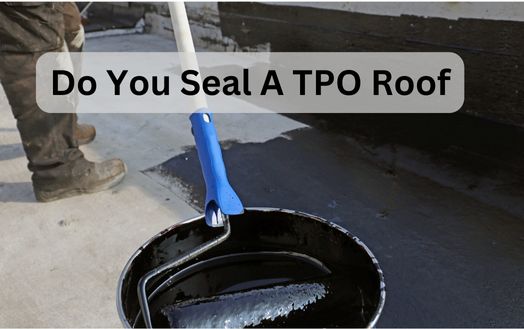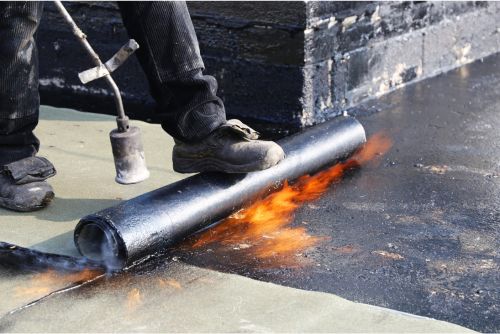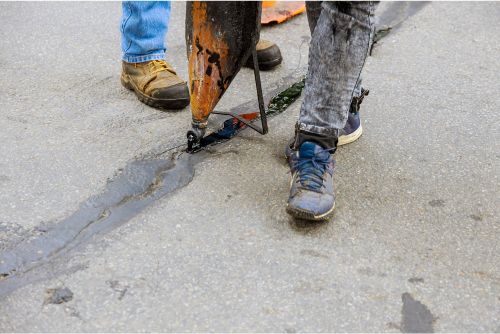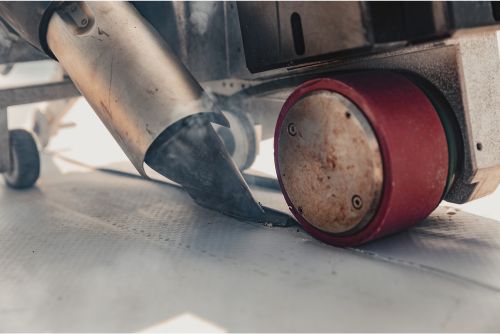
When it comes to roofing systems, TPO (Thermoplastic Olefin) roofs have gained popularity due to their durability, energy efficiency, and cost-effectiveness. TPO roofs are known for their resistance to extreme temperatures, making them suitable for various weather conditions. However, like any roofing system, TPO roofs require regular maintenance to ensure their longevity and optimal performance. One important aspect of TPO roof maintenance is sealing. In this blog post, we will understand if do you seal a TPO roof, the importance of sealing a TPO roof, the benefits it provides, the popular types of sealants, factors to consider when choosing a sealant, and best practices for sealing TPO roofs.
To understand why sealing a TPO roof is necessary, it’s important to first grasp the basics of this roofing system. TPO roofs consist of a TPO membrane, which acts as a protective barrier against environmental factors such as water infiltration, UV rays, and extreme temperatures. While TPO roofing materials are designed to be durable, they can still be susceptible to damage over time. This is where sealing comes into play. By applying a roof coating or sealant, you can enhance the longevity and performance of your TPO roof, protecting it from potential issues like water damage, adhesion issues, and membrane degradation caused by environmental factors.
Sealing plays a vital role in preserving the integrity of TPO roofs. By adding an extra layer of protection, sealants create a barrier that shields the underlying roofing material, particularly the TPO membrane, from water infiltration, UV rays, and extreme temperatures. This protective barrier not only prevents damage to the roof itself but also helps maintain the adhesion between the different layers of the roofing system. Proper adhesion is crucial for the longevity and durability of any roof, including TPO roofs. By sealing a TPO roof, you ensure that all components work together effectively to provide a reliable and durable roofing system. Let us find out more if do you seal a TPO roof.
Choosing not to seal your TPO roof can have significant repercussions. One of the primary concerns is water damage. Without proper sealing, water can infiltrate the roofing system, leading to leaks, sagging, and potential structural damage. Additionally, prolonged exposure to UV rays can cause the TPO membrane to degrade, reducing its effectiveness as a protective barrier. Furthermore, extreme temperatures can affect the performance of the roof, leading to issues such as thermal expansion and contraction, which can compromise its integrity. By neglecting to seal your TPO roof, you increase the risk of costly repairs, energy inefficiency, and discomfort for building occupants.

Sealing your TPO roof offers numerous benefits beyond just preserving its structural integrity. One of the key advantages is improved energy efficiency. A properly sealed TPO roof reduces heat transfer, helping to regulate indoor temperatures and lower energy costs. Additionally, sealing a TPO roof provides long-term cost savings by minimizing the need for frequent repairs and premature commercial roof replacement NJ. It also offers protection from environmental factors such as water infiltration, UV rays, and extreme weather conditions, ensuring a longer lifespan for your roofing system.
Sealing your TPO roof contributes to enhanced energy efficiency, resulting in reduced energy costs. TPO roofing systems are known for their reflective properties, which help deflect sunlight and reduce heat absorption. By sealing the roof, you further enhance its ability to reflect heat, resulting in a cooler building interior and decreased reliance on air conditioning. Moreover, a sealed TPO roof can accommodate solar panels, allowing you to harness renewable energy and further optimize energy efficiency. With energy costs on the rise, sealing your TPO roof is a proactive step towards achieving energy efficiency and cost savings.
Investing in proper sealing for your TPO roof offers long-term cost savings. By avoiding frequent commercial roof repairs NJ and premature replacements, building owners can significantly reduce their maintenance and roofing expenses. Sealants provide effective solutions for protecting the roofing system against environmental factors, ensuring its longevity and durability. Additionally, utilizing sealants with low VOC (Volatile Organic Compounds) emissions is not only beneficial for the environment but also for the building occupants’ well-being. With the right sealant, building owners can enjoy peace of mind knowing that their TPO roof is effectively sealed, reducing the need for costly repairs and replacement in the future.
Sealing TPO roofs forms a protective shield against environmental elements like water infiltration. The use of proper sealants ensures strong adhesion, providing resilience against harsh weather conditions. Additionally, sealing TPO roofs acts as a barrier against UV rays, preserving the integrity of the roofing material and enhancing its durability. This creates an effective solution for weather resistance, ultimately enhancing protection and longevity for TPO roofing.

Exploring different TPO roof sealants is crucial for maintaining the integrity of your roof. Acrylic sealants offer excellent flexibility and UV resistance, making them ideal for TPO roofs. Silicone sealants are known for their exceptional weatherability and durability, providing long-lasting protection. Polyurethane sealants are reliable and robust, offering superior adhesion and movement capability. Each type of sealant has its advantages, so it’s essential to consider the specific needs of your TPO roof before making a choice.
Enhancing the longevity of TPO roofs, acrylic sealants offer durable solutions. Their strong adhesion properties create a reliable bond with TPO membranes, ensuring roof integrity. These sealants provide exceptional weather resistance, protecting TPO roofs from environmental factors. Additionally, their low VOC emissions make them an environmentally-friendly choice. By using acrylic sealants, a protective barrier is established, safeguarding the integrity of TPO roofs.
When considering TPO roofs, silicone sealants offer exceptional longevity, ensuring the durability of thermoplastic olefin roofing systems. Their outstanding adhesion minimizes the risk of commercial leak repair NJ, providing effective solutions for restoring TPO roofs and extending their lifespan. In addition, the weather resistance of silicone sealants enhances TPO roof protection against environmental factors, offering a protective barrier that safeguards the integrity of TPO roofing materials.
When choosing sealants for TPO roofing, consider polyurethane sealants for excellent adhesion and durability. They effectively resist extreme temperatures and weather, creating a protective barrier against water infiltration and UV rays. Building owners seeking longevity and energy efficiency would find them to be a reliable choice. Additionally, their low VOC nature makes them an environmentally friendly option for TPO roof sealants.

When choosing the right TPO roof sealant, it’s important to consider factors such as compatibility, durability, and ease of application. Each type of TPO primer comes with its advantages and limitations, so it’s crucial to weigh these when making your selection. Additionally, taking into account the specific needs of your TPO roof, whether for an RV, travel trailer, or commercial building in Arizona, will help you narrow down the options. Understanding these considerations will ensure that you choose a sealant that provides the best protection for your TPO roof.
When selecting a sealant for a TPO roof, it’s crucial to consider adhesion issues and resistance to extreme temperatures. Evaluate the sealant’s ability to resist water infiltration and adhere to the TPO membrane. Additionally, look for adhesion, weather resistance, and durability, as well as resistance to ponding water, UV rays, and environmental factors. Effective solutions for energy efficiency and water damage prevention are also essential considerations when choosing a sealant for your TPO roof.
When considering the most suitable sealant for TPO roof applications, it’s essential to evaluate the durability, longevity, and adhesion of acrylic coatings. Similarly, one must weigh the pros and cons of silicone sealants, particularly in terms of their adhesion, durability, and longevity. Additionally, assessing the benefits and drawbacks of polyurethane sealants is crucial for TPO roof sealant applications. Moreover, understanding the advantages and disadvantages of acrylic and silicone coatings for TPO roof systems will aid in making an informed decision. It’s important to carefully consider these factors to ensure the selection of the most appropriate sealant for your TPO roof. Asking tips about the best roof sealant from your commercial roofing contractor NJ is highly recommended.

Do you seal a TPO roof? When sealing your TPO roof, it’s important to follow best practices for effective water resistance. Consider using a primer to enhance adhesion and durability, along with proper application of roof coatings to prevent water infiltration. Using reliable sealants is crucial for preventing water damage and improving energy efficiency on TPO roofs. Additionally, acrylic coatings can provide effective resistance to UV rays and extreme temperatures, offering comprehensive protection for your TPO roof.
When sealing TPO roofing systems, using a primer is crucial to enhance adhesion and durability. Additionally, applying roof coatings is essential for creating effective solutions for water resistance and energy efficiency. It’s advisable to consider utilizing durable acrylic coatings due to their adhesion, longevity, and resistance to weather. Following best practices for sealing TPO roofs ensures effective solutions for water resistance, along with the use of reliable sealants to prevent water damage and improve energy efficiency on TPO roofs.
Regular inspection of your TPO roof helps determine when resealing for water resistance is necessary. Maintain energy efficiency by considering resealing. Assess the condition of your roof to determine how often resealing is needed for longevity. Watch for signs of wear and consult professionals for an optimal schedule.
In conclusion, sealing your TPO roof is crucial for its longevity and performance. By neglecting to seal your TPO roof, you expose it to potential damage from environmental factors such as UV rays, moisture, and dirt accumulation. Proper sealing not only enhances the energy efficiency of your building but also provides long-term cost savings by preventing costly repairs and replacements. When choosing a TPO roof sealant, consider factors such as compatibility, durability, and weather resistance. Follow best practices for sealing your TPO roof to ensure a secure and effective seal. While the frequency of resealing may vary depending on factors such as climate and roof condition, regular inspections and maintenance will help determine when resealing is necessary. Take proactive steps to protect your TPO roof and maximize its lifespan by investing in high-quality sealants and adhering to recommended maintenance practices and a help from your trusted commercial roofing company NJ.